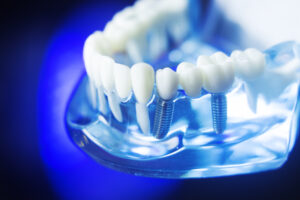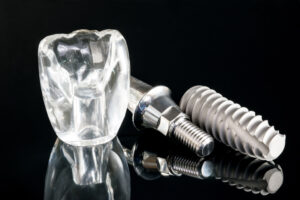Dental implants are one of the most significant advances in dentistry in the past century. What makes them such a big deal? Well, for starters, dental implants are the first and only option for replacing missing teeth that can restore the root. In this blog post, we’ll discuss the logistics of dental implants and answer, “How do dental implants work?”
What are the benefits of dental implants over dentures and bridges?
Because dental implants replace the roots, they look, feel, and function more like natural teeth than dentures and bridges. With the stable support of your jaw, dental implants allow you to eat anything you like, speak without any impediments, and live your life without worrying about your dentures slipping or falling out. The stability of dental implants also makes them more comfortable to wear, as there’s no rubbing or painful sores.
Dental implants also benefit your oral health. Restoring the roots of the teeth stabilize the remaining natural teeth in your mouth, prevent and reverse bone loss in the jaw, and protect against periodontal disease. Deteriorating bone can weaken your bite and make it difficult to eat, and it can even cause a condition called facial collapse, which results in a prematurely aged appearance. You won’t have to worry about any of this with dental implants.
How do dental implants work?
Traditional dental implants are small screws or posts made with a biocompatible material. These fixtures are meant to replace the roots of your teeth, so they are placed directly into the jawbone where the teeth once were. The implants fuse with your jawbone in a process called osseointegration, then abutments are attached to the implants. These abutments secure the restoration that replaces the visible portion of your missing tooth or teeth. The restoration could be a crown for a single missing tooth, a bridge for several adjacent missing teeth, or a denture for when most or all of the teeth on a single arch need replacement.
There are also other types of dental implants that have a slightly different process. These include mini dental implants (MDIs) and same-day implant restorations, which omit the abutment piece and can often be completed in a single appointment. If you are not a candidate for traditional dental implant surgery, we may recommend one of these procedures instead.
When you choose Champagne Smiles for your dental implants, you can be assured a seamless process because we handle all aspects of your procedure ourselves. Instead of having to juggle multiple specialists at different dental practices, our own specialists will take care of periodontal procedures, oral surgery, dental sedation, and designing and creating natural-looking restorations all under one roof for your convenience. We even offer concierge service and spa-like amenities, which is why so many patients travel from throughout the state to see us.
Learn More About Dental Implants in Monmouth County
Champagne Smiles is New Jersey’s Premier Dental Implant Team All Under One Roof. If you’re ready to start your journey to better oral health with Dr. Richard Champagne and a truly collaborative and compassionate dental team, contact Champagne Smiles in Morganville, NJ today to schedule your first appointment.




